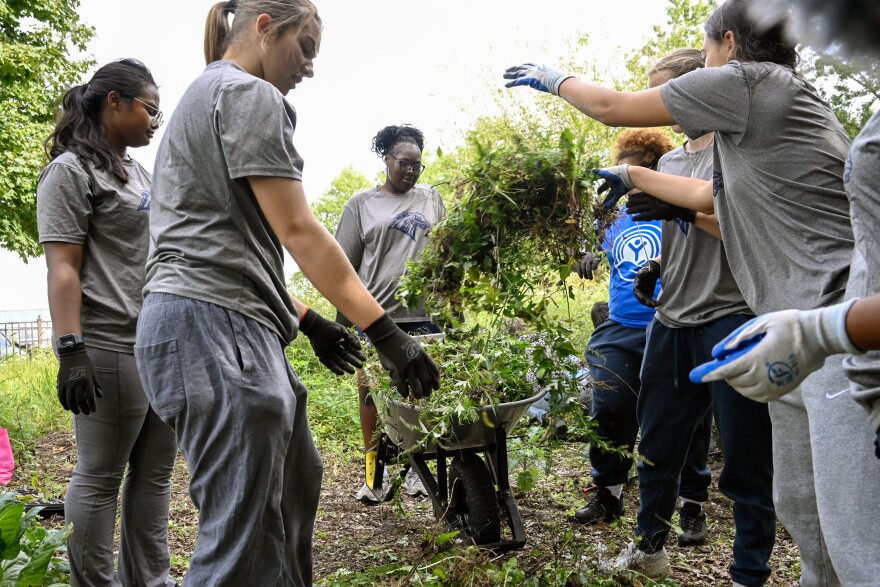Brooke Williams spent the last day of September tending to a community garden by Hill Regional Career High School in New Haven.
She pulled weeds near a few cabbages, some of the last vegetables growing for the season.
“It’s a cold weather crop, able to grow for a couple more weeks, (and) feed the people around here,” Williams said.
Williams, a volunteer at United Way of Greater New Haven, is one of 30 volunteers tending to the garden. Normally, a few farmers would have been there to assist, but because of ongoing federal funding challenges, it’s up to volunteers like Williams to step in and maintain the garden.
It’s one of 44 operated by Gather New Haven, a nonprofit addressing food insecurity. Officials with Gather New Haven say they had to scale back operations as a result. Gather New Haven has since been able to lean on funding from a variety of sources including private donations as well as state and city aid.
The cabbage crops are among the few that are still growing. That is the result of an earlier harvest. Now Gather New Haven and partner organizations fear they could ultimately lose out on federal funds. Gather New Haven Executive Director Jonathón Savage said this was not what they were considering earlier this year.
“This was supposed to be a year of very large change in the community gardens, a very big uplift in the access to resources for the community gardens,” Savage said.
Root Life partners with Gather New Haven to help with the garden’s upkeep. Root Life has faced staffing shortages as a result of federal funding cuts, according to Savage.
Root Life did not respond to Connecticut Public’s request for comment.

But the impacts of the cuts, Savage said, go beyond a lack of upkeep, and referred to a health program relying on freshly grown produce.
“It affects our Diabetes Prevention Program, which is based in the green spaces,” Savage said. It affects people's neighborhoods, because if we don't have the capacity to maintain spaces, then you have to worry about blight.”
Gather New Haven, Savage said, was expecting to get over $350,000 during a three year period earlier this year. It’s part of a larger U.S. Environmental Protection Agency grant, which was announced a little over a month before President Donald Trump took office.
The Trump administration quickly prioritized attempts at cutting back the federal budget, impacting nonprofits across the state, including Gather New Haven. The attempts at freezing already approved federal grants, led to an ongoing lawsuit over the funding.
The city praised a judicial order for the funds to be disbursed earlier this year, but the federal government has since appealed an injunction, according to a city spokesperson. Savage said Gather New Haven expected the funds to be released by April, and when they weren’t, Gather had to pivot toward private donors and other funding sources.
But volunteers are one of the few resources that have not shrunk, according to Dennis Velasquez, a volunteer manager at United Way of Greater New Haven.
“Our volunteer program has definitely grown,” Velasquez said. “When I first started about six years ago, we were averaging anywhere from 50 to 60 events within a calendar year to last year, where we did 111 so we've exponentially grown our volunteer program.”

Savage is optimistic, even amid the uncertainty over federal funding that continues to loom over Gather New Haven. He spoke and looked at the volunteers, pulling weeds and other unwanted growth, tossing them in wheelbarrows.
“It really speaks to our model, neighbors and nature, thriving together,” Savage said. And that's the way we're going to get this work done.”
New Haven Mayor Justin Elicker’s office said an upcoming court date over the funding is expected on Oct. 21.





